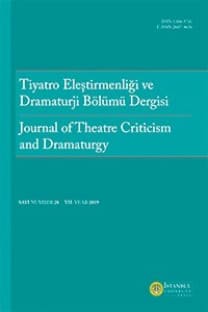Pandemi Sonrası Oyunculuk Eğitiminde Online Teknolojilerin Kullanımı Üzerine Bir Değerlendirme
Bu çalışma küresel pandemi koşullarından çıkıp normalleşme sürecine geçtiğimiz bugünlerde, olağanüstü koşulların dışında da oyunculuk eğitiminde online ders içeriklerinden faydalanabileceğine dair argümanlar oluşturmayı, konuyla ilişkili yapılacak daha gelişkin akademik tartışmaların gerekliliğini ortaya koyan veriler ve başlıklar oluşturmayı hedeflemektedir. Görüleceği üzere oyunculuk eğitiminde online eğitimin sunduğu, esnek zamanlı, mekana ve öğretmen-öğrencinin fiziksel birlikteliğine bağımlı olmayan, öğretmenin öğrenme süreçlerindeki hegemonik işlevini kırıp otodidaktik öğrenmeye yol açan olanakların önündeki en büyük engel, konuyla ilişkili katı ve kalıplaşmış düşüncelere sığınma eğilimidir. Oyunculuk eğitimini tiyatro eğitimine sabitleyen, tiyatroyu da yalnızca onun performatifliğiyle açıklayan ve bu doğrultuda online teknolojileri işlevsiz ve yozlaştırıcı olarak gören algının tartışmaya açılması, genel geçer düşüncelerin yeniden gözden geçirilmesi kritik derecede önem arz etmektedir.
Anahtar Kelimeler:
Online oyunculuk eğitimi, Oyunculuk, Otodidaktizm, Ayna nöronlar, Ekran oyunculuğu
An Evaluation of the Use of Online Technologies in Acting Courses after the Pandemic
As we progress toward a release from the global pandemic conditions and a normalization process, this study aims to mount arguments about the possibility of benefiting from an online learning model for training actors aside from extraordinary conditions and to engender headlines and data that present the requirement of more advanced academic discussions in this situation. As will be seen, the main obstacle to the opportunities online education provides for acting training, which leads to flexible time, independence from space and instructor-student physical togetherness, autodidactic learning with the distortion of the instructor’s hegemonic function in learning processes, is the tendency to take refuge in solid and preconceived ideas about the matter. It is of great significance to bring up for discussion the perception that pins acting training to theatre education, explains theatre only via its performance, and, accordingly, regards online technologies as functionless and degenerative. There is need to revise these mainstream notions.
Keywords:
Online Acting Training, Acting, Autodidacticism, Mirror Neurons, Screen Acting,
___
- “Acting”. Udemy. Erişim 20 Eylül, 2021. https://www.udemy.com/topic/acting/?p=1 google scholar
- “Acting Programs”. The Barrow Group. Erişim 26 Eylül, 2021. https://www.barrowgroup.org/events/class-schedule/category/fall-2021#acting-programs google scholar
- “Acting School”. New York Film Academy, Erişim 27 Eylül, 2021. https://www.nyfa.edu/acting-school/ google scholar
- Aristotle. Poetics, Translated by Anthony Kenny. Oxford: Oxford University Press, 1995. google scholar
- “Autodidacticism”, erişim 03 Eylül 2021, https://educalingo.com/en/dic-en/autodidacticism google scholar
- Camilleri, Frank. “Towards the Study of Actor Training in An Age of Globalised Digital Technology.” Theatre, google scholar
- Dance and Performance Training 6:1 (2015): 16-29. http://dx.doi.org/10.1080/19443927.2014.985334 google scholar
- Chocano, Carina. “What is Masterclass Actually Selling.” The Atlantic. yayın tarihi Eylül, 2020. https://www. theatlantic.com/magazine/archive/2020/09/what-is-masterclass-actually-selling/614200/ google scholar
- Coşkun, Abdurrahman. “Ayna Nöronlar”, Bilim ve Teknik 557, Nisan (2014): 62-65. google scholar
- “Film, TV”. Masterclass com. Erişim 23 Eylül, 2021. https://www.masterclass.com/ google scholar
- Fischer-Lichte. Erika, Performatif Estetik. Çeviren Tufan Acil. İstanbul: Ayrıntı Yayınları, 2016. google scholar
- Keysers, Christian. Empatik Beyin. Çeviren Aybey Eper. İstanbul: Alfa Yayınları, 2011. google scholar
- Melberg. Arne, Theories of Mimesis. Cambridge: Cambridge University Press, 1995. google scholar
- “Method in Focus Online Acting Class”. The Lee Strasberg Theatre & Film Institute. 24 Eylül, 2021. https:// strasberg.edu/online/method-in-focus/ google scholar
- Mohtadi, Niloofar. “Jonathan Pitches on Physical Theatre’s Ability to Transform Written Text”. The Theatre Times. Yayın tarihi 31 Mayıs, 2020. https://thetheatretimes.com/jonathan-pitches-on-physical-theatres-ability-to-transform-written-text/ google scholar
- “Online Acting Classes”. The Lee Strasberg Theatre & Film Institute . Erişim 24 Eylül, 2021. https:// strasberg.edu/online/ google scholar
- “Online Screen Acting Courses”. Actors Studio. Erişim 24 Eylül, 2021. https://actorsstudio.co.uk/home/ online-screen-acting-courses/ google scholar
- Phelan, Peggy. Unmarked: The Politics of Perfomance. London: Routledge, 1993. google scholar
- “Phsycal Theatre: Exploring The Slap”. Future Learn. Erişim 29 Eylül, 2021. https://www.futurelearn.com/ courses/physical-theatre-exploring-the-slap google scholar
- Roznowski, Rob. “Transforming Actor Education in the Digital Age.” Theatre Topics 25 (2015): E1. http:// dx.doi.org/10.1353/tt.2015.0028 google scholar
- Sadeghi, Manijeh. “A Shift from Classroom to Distance Learning: Advantages and Limitations.” International Journal of Research 4 (2019): 80-88. http://dx.doi.org/10.29252/ijree.4.1.80 google scholar
- “Theatre Studies Online” Rose Bruford College. Erişim 30 Eylül, 2021. https://www.bruford.ac.uk/learn/ undergraduate-courses/theatre-studies-online/ google scholar
- “Theatre Studies Programme Specification” Rose Bruford College. Erişim 30 Eylül, 2021. https://www. bruford.ac.uk/wpcontent/uploads/2021/07/Theatre_Studies_Programme_Specification_2018_B.pdf google scholar
- Williams, Kerry. “Self Directed Learning in the Visual Arts”, presentation, Flexible Futures in Tertiary Teaching-Proceedings of the 9th Annual Teaching Learning Forum, Perth, 2-4 February 2000. https:// litec.curtin.edu.au/events/conferences/tlf/tlf2000/williams.html google scholar
- ISSN: 1303-8605
- Yayın Aralığı: Yılda 2 Sayı
- Başlangıç: 2002
- Yayıncı: İstanbul Üniversitesi
Sayıdaki Diğer Makaleler
“Everywhere is Warmer than the house”: ‘Traumaculture’ in Laura Wade’s Colder Than Here
Pandemi Sonrası Oyunculuk Eğitiminde Online Teknolojilerin Kullanımı Üzerine Bir Değerlendirme
Undoing Gender: Contemporary Women Theatre Makers in India
Fotoğraf, Ses, Kayıt Üçgeninde Tiyatro: Amazonlar’dan Televizyon Ekranına “The Encounter”
